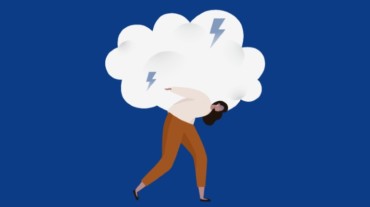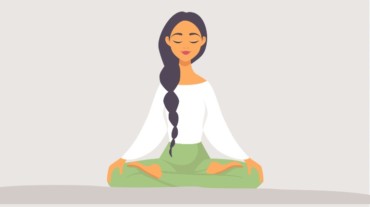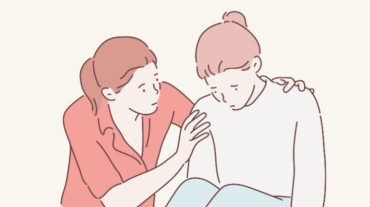
Living in the age of instant soups, 2-minute noodles, 1-week-weight-loss plans,
and bullet-quick modes of transportation surely have its perks. After all, we
can achieve so much more in such a short span of time. On the downside,
though, these quick-fixes really can make us feel that every problem in life can
be quickly fixed. Unfortunately, the scope of “every problem” also includes
something as serious as a mental health issue like anxiety.
Clinically defined as your body’s natural response to chronic or recurring
stress, anxiety can cause feelings of fear and apprehension about what’s to
come. If left untreated, undiagnosed, or mismanaged—it can pave the way for
severe anxiety disorders such as panic disorder, phobias, social/health anxiety,
trauma, obsessive-compulsive disorder, and clinical depression.
Clinical psychotherapist, Radhika Bapat says”
Severe anxiety results in an inability to attend to our surroundings as a result of physical symptoms such as an increase in heart rate, sweating, dryness of mouth, and so on.
She also explains that “In some cases, this leads to what is known as a “panic attack” where a person feels they could be in danger of having a heart attack or dying (which is not the case). After suffering from such an episode people tend to become hypervigilant about their surroundings and their bodies. They may also
complain of sleep disturbances as a result of this constant worrying,” she
explains.
So, can we fix it quickly before it gets any worse?
To figure this out, let’s take the example of weight management for a minute.
It takes several months or years of bad eating habits and a sedentary lifestyle to get to the point of obesity. And then, we want to get rid of it within days
and weeks, as soon as we realise that we need to “get back in shape”.
Surely, a few “quick-fix” diets can help you shed off weight quickly, but you’re
bound to bounce back to your overweight status as soon as you get off those
nutritionally-deficient and restrictive diets.

Similarly, anxiety disorders are not one-day wonders. It takes years or months
of chronic stress, unreleased anger, and mismanaged feelings to get to a point
where your body starts reacting by causing tremendous anxiety or panic.
Hence, to think that some quick-fix can make this anxiety vanish in a jiffy and
that the next day onwards there will be no trace of it left in your life is like
expecting China to play fair in a war (#JustSaying).
That said, there are definitely a few effective ways that can calm you down
Bapat suggests the following ways to effectively deal with your anxiety and
lessen its impact:
1. Distraction and breathing
According to Bapat, people suffering from anxiety can feel better with
distraction techniques and breath focus. Hence, it is a great idea to take
deep breaths when you feel like you’ve been triggered or that your
anxiety levels are rising.
Select Topics of your interest and let us customize your feed.
PERSONALISE NOWAdditionally, you can also distract yourself with an activity that you
really enjoy doing so as to feel better and well—counter anxiety with
some happy hormones in your body (endorphins).
2. Limit info intake
“The most effective way to calm underlying anxiety right now is to
manage your exposure to news about the covid-19 pandemic. Designate
a particular time each day to allow for this exposure to negative news
and depend only on authentic information from authentic sources,”
Bapat suggests.

Apart from covid-19 news, if there are any other negative pieces of
information on television or social media, taking a break from it can really help
you feel way, way better. Try it to believe it.
3. Designate a “worry hour”
Bapat suggests that another effective way to handle negative and
worrying thoughts that come to your mind all-day long is to postpone
them to a specific hour, called the “worry hour” every day.
“So for instance, if you settle on 3-3:30 pm every day as your worry hour, and
you happen to start worrying just before bedtime, instruct yourself to
postpone the thoughts until 3 p.m. the next day,” she says.
4. Cash in on the power of your imagination
Another science-backed technique used to calm the body down is the
power of your imagination, says Bapat.
She further explains that the use of what is known as “guided imagery” (which
involves indulging in a pleasant, vivid daydream to feel better) can help relax
your mind in times of anxiety.
5. Observe your patterns
Over the course of time, if you manage to remain calm enough and
observe the waves and pattern of your anxiety, you’ll realise that there
maybe certain triggers that kickstart those feelings of fear and worry.
Identifying those triggers and isolating from them can really help you
prevent a bout of anxiety. Not to mention, knowing that this is a wave of
negative emotion and letting it pass is yet another mindful way of
dealing with it.
6. Don’t underestimate the power of communication
It’s always great to have a sound support system in the form of patient,
understanding and trustworthy family and friends, who can hear you out
and help you vent out your feelings.

However, if you don’t have too many people to talk to, maintaining a
journal and writing down your feelings is a scientifically-proven method
of battling a mental health issue such as anxiety and depression.
7. Lastly, don’t be scared to seek help
“Make sure to address your anxiety rather than ignoring it, because you
deserve to be happy,” says Bapat. Perhaps, medication and therapy
during the initial stages can really prevent your anxiety from growing
into a bigger mental illness.